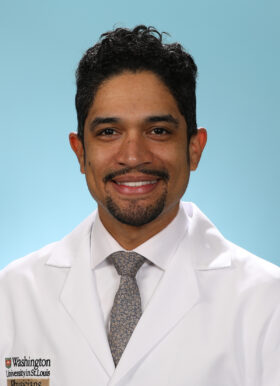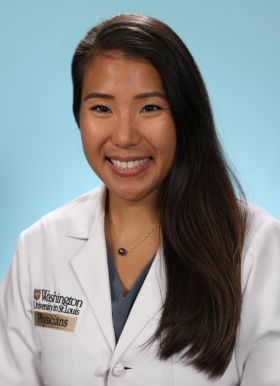
To make an appointment, call 314-747-WUIE (9843). Fax: 314-747-1277.
Interventional endoscopy is a division of Gastroenterology that performs pancreatic and biliary endoscopy (ERCP and EUS), advanced staging of digestive tumors and pancreatic tumors, endoscopy for weight loss, third space endoscopy, interventional IBD and advanced resection of various lesions of the gastrointestinal tract.
Endoscopic retrograde cholangiopancreatography (ERCP)
ERCP is a specialized technique used to study the drainage ducts of the gallbladder, pancreas and liver. The procedure is used primarily to diagnose and treat conditions of the bile ducts, including gallstones, inflammatory blockages from scarring, leaks (from trauma or surgery) and cancer.
Endoscopic ultrasonography (EUS)
EUS allows the doctor to examine the walls of the upper and lower gastrointestinal tract, as well as study internal organs that are close to the GI tract, like the liver, gallbladder and pancreas. It can be used to evaluate an abnormality, such as a lump, or diseases of the pancreas, bile duct or gallbladder. For patients with cancer, it can help accurately assess the cancer’s depth and whether it has spread to adjacent lymph nodes. In most cases, it can be used to obtain biopsy samples. We also offer EUS-guided therapies, which help patients avoid surgery or other more invasive procedures. These include EUS-guided gastrojejunostomy, EUS-guided gallbladder drainage, EUS-guided access to the bile duct or pancreatic duct and EUS-directed trans-gastric ERCP (EDGE) in patients after gastric bypass.
Endoscopic mucosal resection and endoscopic submucosal dissection
Endoscopic mucosal resection (EMR) is used when large polyps cannot be removed with standard polypectomy. This allows for safe removal of polyps with low risk of recurrence. For large polyps not amenable to EMR, endoscopic submucosal dissection (ESD), which allows for deeper dissection of the polyp or lesion, provides a safe and effective modality for resection. Our interventional endoscopy group is well-equipped to manage various polyps and lesions of the gastrointestinal tract, tailoring the treatment approach to each patient while ensuring safe removal and low risk of recurrence.
Endoscopic hepatology
Endoscopic ultrasound has assisted with the management of patients with liver disease. Through this procedure, doctors assess the liver for abnormalities, obtain liver biopsies, sample abnormal liver lesions, evaluate for portal hypertension commonly seen in patients with cirrhosis and treat gastric varices (abnormally dilated vessels in the stomach wall that are high risk of bleeding).
Third space endoscopy
In third space endoscopy, that the doctor accesses deeper layers of the gastrointestinal system to treat various conditions. This includes performing per-oral endoscopy myotomy (POEM) for the treatment of achalasia (E-POEM) and gastroparesis (G-POEM). Additionally, third space endoscopy encompasses advanced tissue resection techniques such as endoscopic submucosal dissection (ESD) and endoscopic full thickness resection (EFTR).
Interventional IBD
The tools used for third space endoscopy and advanced tissue resection have opened new possibilities for patients with structural complications from inflammatory bowel disease (IBD). At Washington University Interventional Endoscopy, we serve as an integral part of the multidisciplinary IBD center to provide a solution for patients with structural complications who wish to avoid surgery. We offer endoscopic treatments for strictures (including balloon dilation, endoscopic stricturotomy, stenting) and advanced endoscopic resection techniques to manage colitis-associated neoplasia. In addition, we have expertise in the evaluation of perianal disease and endoscopic treatment of fistulas.
Non-surgical bariatric endoscopy weight-loss
To make an appointment, call 314-362-2652
Take the first step: Sign up for a free informational session
Washington University offers a variety of nonsurgical options and support services so you can achieve your goals and live a healthy, active life. Our 12-month programs include a medical evaluation by board-certified Washington University gastroenterologists, endoscopic procedures and personalized counseling from a behavior coach and registered dietitian. We offer:
- Intragastric balloon therapy
- Endoscopic sleeve gastroplasty
- Endoscopic gastric outlet repair (endoscopic revision to previous surgery/procedure)
Candidates for nonsurgical weight loss include those who:
- Are at least 30 pounds overweight
- Have attempted weight loss through diet and exercise without success
- Are willing to participate in a medically supervised program, including nutritional counseling and lifestyle behavior coaching
- Are 22 years old or older
- Are not pregnant or breastfeeding

Juan Reyes Genere, MD
Gastroenterology
Inflammatory Bowel Disease
Interventional Endoscopy
Locations:
Barnes-Jewish Hospital
Barnes-Jewish West County Hospital – Medical Office Building 4
Missouri Baptist Medical Center

Ashley Sherrill, MSN, APRN, FNP-C
Gastroenterology
Interventional Endoscopy
Locations:
Center for Advanced Medicine Gastrointestinal Center
Barnes-Jewish Hospital
Barnes-Jewish West County Hospital – Medical Office Building 4

Judy Trieu, MD
Gastroenterology
Interventional Endoscopy
Locations:
Center for Advanced Medicine Gastrointestinal Center
Barnes-Jewish Hospital
Barnes-Jewish West County Hospital
Missouri Baptist Medical Center